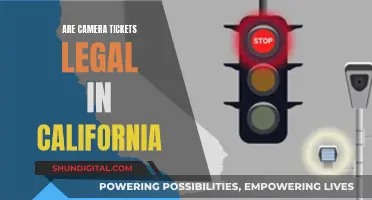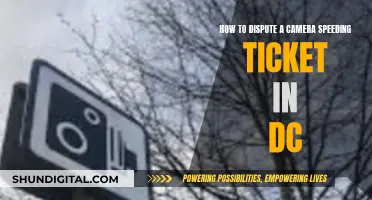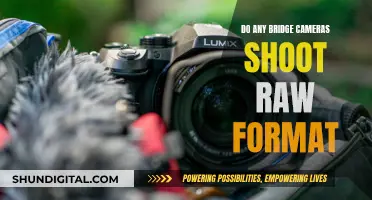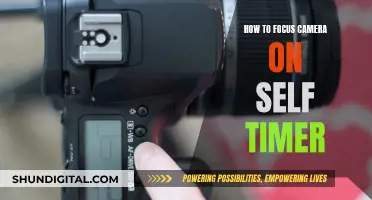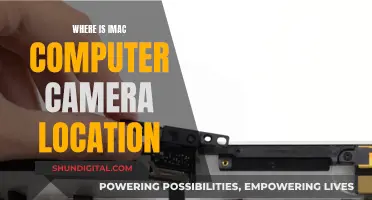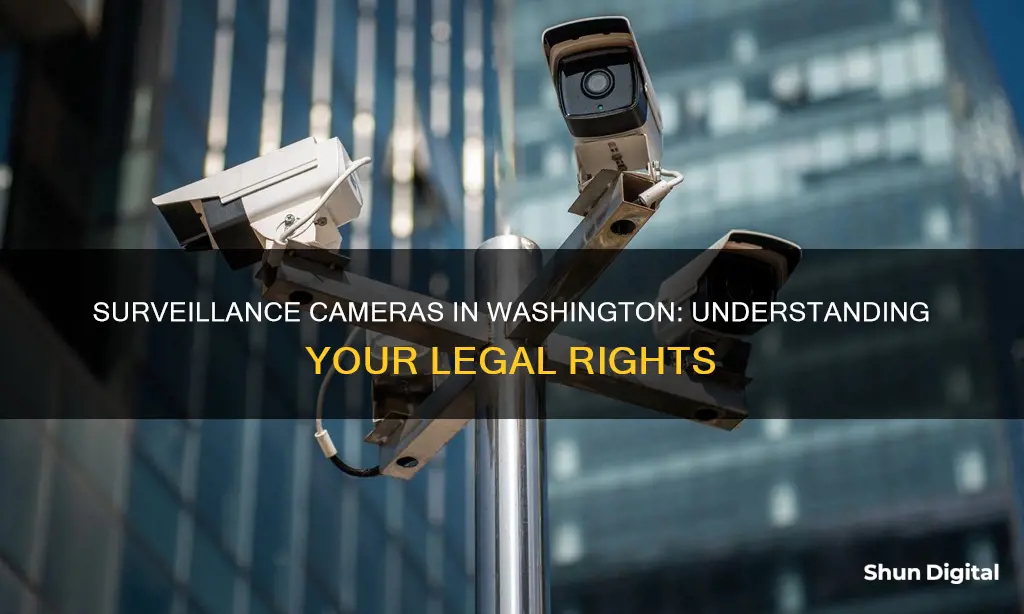
Washington state has a number of laws regarding the use of surveillance cameras, particularly concerning audio recording. Washington is considered an 'all-party consent' state, meaning that all parties involved in a recorded communication must give permission. This includes private conversations that happen in public spaces. As such, homeowners are advised to avoid audio recording and stick to video-only surveillance cameras.
What You'll Learn

Consent for audio recording
Washington state law requires that all parties consent before recording a conversation or electronic communication. This is known as a "two-party consent" law. It is a criminal offence to record a private conversation without the consent of all involved parties.
To record conversations legally, at least one participant must announce their intention to record and include it in the recording. This can be done by "announc [ing] to all other parties...that such communication or conversation is about to be recorded or transmitted", so long as this announcement is also recorded.
There are some exceptions to the two-party consent law. For example, in cases of emergency, threat, anonymous or inconvenient circumstances, or hostage situations, one-party consent may be sufficient. Additionally, if the conversation is not deemed "private", consent may not be required. To be considered private, there must be a subjective intention for the conversation to be private and a reasonable expectation of privacy. For example, the presence of a third party typically disqualifies a conversation as private.
In the workplace, employers are generally required to inform employees of the presence of audio and video surveillance cameras and obtain their consent, either explicitly or implicitly. Employers should provide clear and conspicuous notice, such as posting signs or including a notice in employment agreements or policies.
Washington state also has specific regulations regarding the retention and access of recorded footage. Employers should establish clear policies to ensure that only authorised personnel have access to the footage for legal purposes. Transparency is crucial to ensure that employees are aware of the monitoring activities and can make informed decisions.
Apeman Trail Camera Batteries: Powering Your 1080p Adventure
You may want to see also

Public vs private spaces
Washington State has strict privacy laws, and the use of security cameras in public and private spaces is regulated. The state has more laws governing the use of surveillance cameras than any other state.
In terms of public spaces, local governments have significant freedom to use security cameras to record activity in public places and government facilities, such as public parks or city halls. However, individuals' right to privacy must be considered. While people generally do not have a reasonable expectation of privacy in public areas, there are still limitations on the use of security cameras. Cameras should not be placed in areas where a person would have a reasonable expectation of privacy, such as changing rooms and restrooms.
Regarding private spaces, Washington State law requires that all parties consent before recording a conversation or electronic communication. This includes recordings made by security cameras with an audio component. Installing security cameras in private areas, such as bedrooms and changing rooms, is illegal, and tenants can take legal action.
To record conversations legally, at least one participant must announce their intention to record and include it in the recording. There are exceptions for emergency, threat, anonymous, or inconvenient situations where one-party consent may be sufficient.
In the workplace, employers must inform employees of the presence of video surveillance cameras, particularly if audio is also being recorded, and obtain their consent. Employers should provide clear and conspicuous notice, such as posting signs or including a notice in employment agreements or policies.
In summary, while the use of security cameras in Washington State is legal, there are strict regulations governing their use in both public and private spaces to protect individuals' privacy rights.
Understanding DC Camera Tickets and Fines
You may want to see also

Wiretapping laws
Washington State has a set of stringent privacy laws in place, including wiretapping laws, which are outlined in RCW 9.73.030. This makes Washington a two-party consent state, meaning that recording conversations or electronic communications without the consent of all involved parties is a criminal offence.
To be considered and protected as private, a conversation must meet certain criteria. There must be a subjective intention from all parties for the conversation to remain private, and a reasonable expectation of privacy. For example, a conversation in a public space is exempt from this law as there is no reasonable expectation of privacy.
To record a conversation legally, at least one participant must announce their intention to record and include this in the recording. An exception to this rule is if the recording is being made by a full-time, part-time, or contractual employee of a regularly published newspaper, magazine, wire service, radio station, or television station, who is gathering news. In this case, the employee must use a recording device that is readily apparent or obvious to the speakers.
There are also exceptions to the two-party consent rule. For example, in emergency, threat, anonymous, or inconvenient situations, the consent of only one party is required.
It is important to note that violating wiretapping laws can result in criminal prosecution and civil lawsuits.
Concealing Surveillance Wires in a Two-Story House
You may want to see also

Use of recorded footage
The use of recorded surveillance footage is governed by strict privacy laws in Washington State, which require the consent of all involved parties for any recording to be made. However, there are exceptions for emergency, threat, anonymous, or inconvenient situations, where one-party consent is sufficient.
In the context of video surveillance, Washington law only requires consent before recording a conversation or communication. Therefore, video surveillance cameras that do not have an audio component or where the audio is muted are generally within the bounds of privacy law.
The use of recorded footage for a purpose other than crime prevention or investigation may pose issues of misappropriation. For example, posting recorded video to social media or other internet outlets without the consent of all involved parties is a federal offense and may result in a lawsuit if it paints a person in a misleading or false light.
Recorded footage can be used to aid law enforcement agencies in identifying suspects, understanding the sequence of events, and facilitating a successful investigation. This evidence can also be crucial in legal proceedings or insurance claims, strengthening the case and ensuring justice is served.
Employers in Washington must establish clear policies for retention and access to recorded footage, ensuring that only authorised personnel have access and that it is used for legal purposes. Transparency is crucial, and employees must be made aware of the monitoring activities through adequate notification.
Fujifilm S1: The Right Camera Battery Choice
You may want to see also

Privacy laws
Washington State has some of the strictest privacy laws in the country. The state is considered an all-party consent or two-party consent state, meaning that all participants in a conversation must give permission for it to be recorded. This applies to both video and audio recordings.
To record conversations legally, at least one participant must announce their intention to record and include this in the recording. This is a requirement of RCW 9.73.030. There are exceptions to this rule in cases of emergencies, threats, anonymous or inconvenient situations, or hostage situations, where one-party consent is sufficient.
In terms of video surveillance, it is generally legal to film areas that are viewable to the public. Video surveillance cameras that do not have an audio component or are muted are usually within the bounds of privacy law. However, there are specific regulations regarding the installation of security cameras. For example, it is illegal to install cameras in private areas such as bedrooms and changing rooms, and tenants can pursue legal action if this occurs.
Cameras should be positioned in areas where there is no reasonable expectation of privacy, such as public areas, entrances, hallways, and common spaces. It is important to be transparent about the use of security cameras, and employers or property owners should provide clear and conspicuous notice through signage or other means.
Additionally, employers in Washington must establish clear policies for retention and access to recorded footage. Access should be limited to authorised personnel for legal purposes only, and recordings should not be used to infringe upon employees' rights or for illegal purposes.
Choosing the Right Spot for Camera Surveillance
You may want to see also
Frequently asked questions
In most states, you don't need consent to videotape people in your home. However, it is illegal to record hidden-camera video in areas where the subject has a reasonable expectation of privacy, such as the bathroom.
Washington state is a two-party consent state, meaning that all parties must consent before a recording occurs. This applies to both audio-only and audio-visual recordings.
In general, it is legal to film areas that are viewable to the public. People in public spaces do not have a reasonable expectation of privacy. However, it is illegal to record audio without consent, even on your own property.
Yes, it is illegal to record video or audio with malicious intent, such as using the recording for blackmail. Additionally, posting or sharing footage without the permission of the surveilled subject, for a purpose other than proving or preventing a crime, may pose legal issues.


